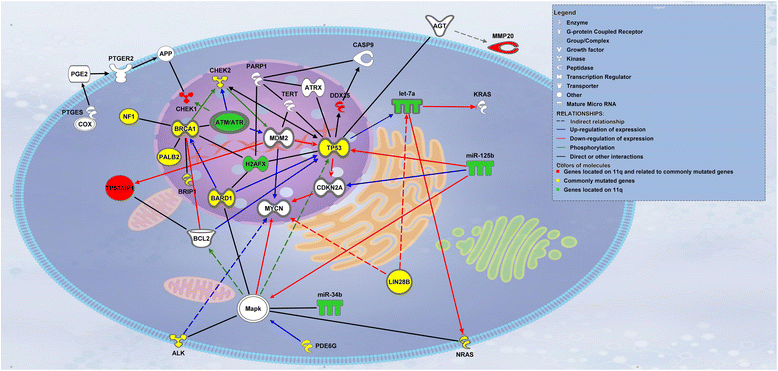11q deletion in neuroblastoma: a review of biological and clinical implications
- PMID: 28662712
- PMCID: PMC5492892
- DOI: 10.1186/s12943-017-0686-8
11q deletion in neuroblastoma: a review of biological and clinical implications
Abstract
Deletion of the long arm of chromosome 11 (11q deletion) is one of the most frequent events that occur during the development of aggressive neuroblastoma. Clinically, 11q deletion is associated with higher disease stage and decreased survival probability. During the last 25 years, extensive efforts have been invested to identify the precise frequency of 11q aberrations in neuroblastoma, the recurrently involved genes, and to understand the molecular mechanisms of 11q deletion, but definitive answers are still unclear. In this review, it is our intent to compile and review the evidence acquired to date on 11q deletion in neuroblastoma.
Keywords: 11q deletion; Cancer; Development; MYCN amplification; Metastasis; Neuroblastoma; Review.
Conflict of interest statement
Ethics approval and consent to participate
Not applicable.
Consent for publication
Not applicable.
Competing interests
All authors declare that they have no competing interests.
Publisher’s Note
Springer Nature remains neutral with regard to jurisdictional claims in published maps and institutional affiliations.
Figures


References
-
- Pizzo PA, Poplack DG. Principles and Practice of Pediatric Oncology. Philadelphia: Sixth ed: Wolters Kluwer Health / Lippincott Williams and Wilkins; 2010.
-
- Encinas M, Iglesias M, Liu Y, Wang H, Muhaisen A, Cena V, et al. Sequential treatment of SH-SY5Y cells with retinoic acid and brain-derived neurotrophic factor gives rise to fully differentiated, neurotrophic factor-dependent, human neuron-like cells. J Neurochem. 2000;75:991–1003. - PubMed
Publication types
MeSH terms
LinkOut - more resources
Full Text Sources
Other Literature Sources
Medical

